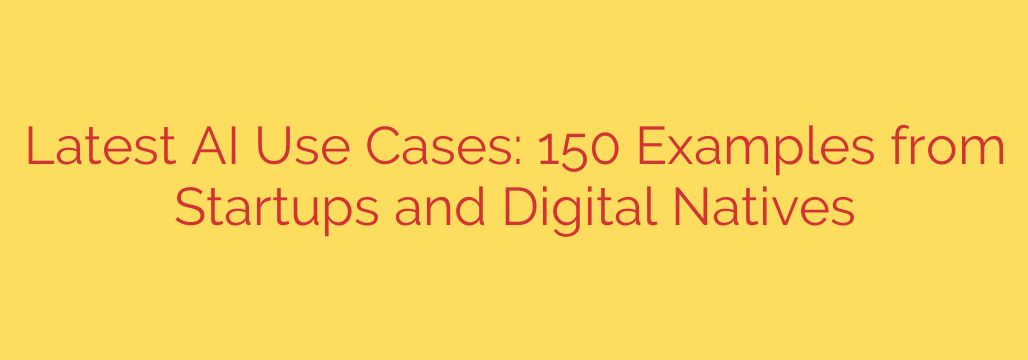
Beyond the Hype: Real-World AI Use Cases Transforming Business Today
Artificial intelligence is no longer a futuristic concept from science fiction; it’s a powerful tool that businesses are actively using to drive growth, boost efficiency, and create smarter products. While the headlines often focus on groundbreaking models, the real revolution is happening in the practical, everyday applications that are reshaping entire industries.
But how are companies actually using AI? Moving past the buzzwords, we’ll explore the concrete AI use cases that are delivering tangible results across various business functions and sectors.
AI in Marketing and Sales: The Era of Hyper-Personalization
The days of one-size-fits-all marketing are over. AI is enabling businesses to understand and engage customers on an individual level, leading to higher conversion rates and stronger brand loyalty.
Personalized Customer Experiences: AI algorithms analyze user behavior, purchase history, and browsing data to deliver personalized content and product recommendations in real-time. Think of how streaming services suggest your next favorite show or how e-commerce sites display products you’re likely to buy. This creates a more relevant and engaging experience for every user.
Generative AI for Content Creation: Content is king, but creating it at scale is a major challenge. Generative AI tools are now automating the creation of marketing copy, blog post drafts, social media updates, and email campaigns. This frees up marketing teams to focus on strategy and creativity rather than routine writing tasks.
Predictive Lead Scoring: Sales teams can now focus their efforts where it matters most. AI models analyze thousands of data points to predict which leads are most likely to convert into paying customers. This data-driven approach dramatically improves sales efficiency and resource allocation.
Revolutionizing Operations and Customer Support
Behind the scenes, AI is the engine powering a new level of operational excellence. From the supply chain to the help desk, automation and intelligent decision-making are streamlining complex processes.
Intelligent Customer Support Chatbots: Modern AI chatbots have moved far beyond simple, scripted responses. They use Natural Language Processing (NLP) to understand customer intent, providing 24/7 customer support, resolving common queries instantly, and escalating complex issues to human agents seamlessly.
Supply Chain and Inventory Optimization: For businesses that manage physical goods, AI is a game-changer. Machine learning models are used for predicting demand, managing inventory levels, and optimizing delivery routes, which reduces waste, lowers costs, and ensures products are available when and where customers need them.
AI-Powered Fraud Detection: In the financial and e-commerce sectors, security is paramount. AI systems excel at identifying and flagging potentially fraudulent transactions in real-time by recognizing patterns and anomalies that would be impossible for humans to detect at scale.
AI in Human Resources and Talent Management
Finding and retaining top talent is one of the biggest challenges for any organization. AI is making HR processes more efficient, data-driven, and fair.
Automated Resume Screening: Recruiters are often inundated with hundreds or thousands of applications for a single role. AI tools can automatically screen resumes to identify the most qualified candidates based on predefined criteria, saving countless hours and reducing unconscious bias in the initial screening phase.
Employee Engagement and Attrition Prediction: By analyzing anonymized data from employee surveys and communication patterns, AI can perform sentiment analysis to gauge overall morale and identify teams or individuals at risk of attrition. This allows management to proactively address issues before they lead to turnover.
Industry-Specific AI Breakthroughs
Beyond general business functions, AI is making deep inroads into specialized industries, solving unique and complex problems.
Healthcare: AI is at the forefront of medical innovation. It’s being used for analyzing medical images like X-rays and MRIs to detect diseases like cancer with incredible accuracy. Furthermore, AI algorithms are accelerating the process of discovering and developing new drugs by modeling complex biological interactions.
Finance: The financial world runs on data, making it a perfect fit for AI. Machine learning is used for executing high-frequency algorithmic trades based on market signals and for developing sophisticated credit scoring models that assess risk more accurately than traditional methods.
How to Get Started with AI in Your Business
Implementing AI doesn’t have to be an intimidating, all-or-nothing endeavor. By taking a strategic approach, any organization can begin to leverage its power.
Identify a Clear Business Problem: Start with a specific pain point. Are you struggling with customer response times? Is your inventory management inefficient? Choose a problem where AI can provide a measurable solution.
Start Small and Scale: You don’t need to build a complex, enterprise-wide system from day one. Begin with a pilot project, such as implementing a customer support chatbot or using an AI-powered marketing tool. Prove the value on a small scale before expanding.
Focus on Data Quality: AI models are only as good as the data they are trained on. Ensure you have clean, well-organized, and relevant data. “Garbage in, garbage out” is the golden rule of AI.
Prioritize Security and Ethics: As you adopt AI, it is crucial to consider the security of your data and the ethical implications of your models. Ensure transparency, fairness, and compliance with privacy regulations like GDPR.
Artificial intelligence is a transformative technology that is already here, providing a powerful competitive advantage to those who embrace it. The question is no longer if your business should adopt AI, but how and where you can apply it to unlock new levels of growth and innovation.
Source: https://cloud.google.com/blog/topics/startups/150-ai-use-cases-leading-startups-and-digital-natives/








